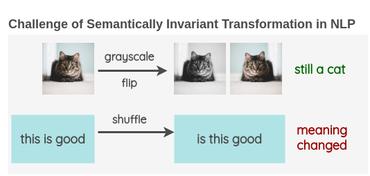Search Results for author: Branislav Pecher
Found 9 papers, 5 papers with code
Comparing Specialised Small and General Large Language Models on Text Classification: 100 Labelled Samples to Achieve Break-Even Performance
no code implementations • 20 Feb 2024 • Branislav Pecher, Ivan Srba, Maria Bielikova
When performance variance is taken into consideration, the number of required labels increases on average by $100 - 200\%$ and even up to $1500\%$ in specific cases.
On Sensitivity of Learning with Limited Labelled Data to the Effects of Randomness: Impact of Interactions and Systematic Choices
no code implementations • 20 Feb 2024 • Branislav Pecher, Ivan Srba, Maria Bielikova
To measure the true effects of an individual randomness factor, our method mitigates the effects of other factors and observes how the performance varies across multiple runs.
Automatic Combination of Sample Selection Strategies for Few-Shot Learning
no code implementations • 5 Feb 2024 • Branislav Pecher, Ivan Srba, Maria Bielikova, Joaquin Vanschoren
In few-shot learning, such as meta-learning, few-shot fine-tuning or in-context learning, the limited number of samples used to train a model have a significant impact on the overall success.
Effects of diversity incentives on sample diversity and downstream model performance in LLM-based text augmentation
1 code implementation • 12 Jan 2024 • Jan Cegin, Branislav Pecher, Jakub Simko, Ivan Srba, Maria Bielikova, Peter Brusilovsky
The latest generative large language models (LLMs) have found their application in data augmentation tasks, where small numbers of text samples are LLM-paraphrased and then used to fine-tune downstream models.
On the Effects of Randomness on Stability of Learning with Limited Labelled Data: A Systematic Literature Review
no code implementations • 2 Dec 2023 • Branislav Pecher, Ivan Srba, Maria Bielikova
Recently, this area started to attract a research attention and the number of relevant studies is continuously growing.
KInITVeraAI at SemEval-2023 Task 3: Simple yet Powerful Multilingual Fine-Tuning for Persuasion Techniques Detection
1 code implementation • 24 Apr 2023 • Timo Hromadka, Timotej Smolen, Tomas Remis, Branislav Pecher, Ivan Srba
This paper presents the best-performing solution to the SemEval 2023 Task 3 on the subtask 3 dedicated to persuasion techniques detection.
Auditing YouTube's Recommendation Algorithm for Misinformation Filter Bubbles
1 code implementation • 18 Oct 2022 • Ivan Srba, Robert Moro, Matus Tomlein, Branislav Pecher, Jakub Simko, Elena Stefancova, Michal Kompan, Andrea Hrckova, Juraj Podrouzek, Adrian Gavornik, Maria Bielikova
We also observe a sudden decrease of misinformation filter bubble effect when misinformation debunking videos are watched after misinformation promoting videos, suggesting a strong contextuality of recommendations.
Monant Medical Misinformation Dataset: Mapping Articles to Fact-Checked Claims
1 code implementation • 26 Apr 2022 • Ivan Srba, Branislav Pecher, Matus Tomlein, Robert Moro, Elena Stefancova, Jakub Simko, Maria Bielikova
It also contains 573 manually and more than 51k automatically labelled mappings between claims and articles.
An Audit of Misinformation Filter Bubbles on YouTube: Bubble Bursting and Recent Behavior Changes
1 code implementation • 25 Mar 2022 • Matus Tomlein, Branislav Pecher, Jakub Simko, Ivan Srba, Robert Moro, Elena Stefancova, Michal Kompan, Andrea Hrckova, Juraj Podrouzek, Maria Bielikova
We present a study in which pre-programmed agents (acting as YouTube users) delve into misinformation filter bubbles by watching misinformation promoting content (for various topics).




